Meet Our Team
Please find below the profiles of our Principal Investigators,
as well as other current and previous group members
Group Leader
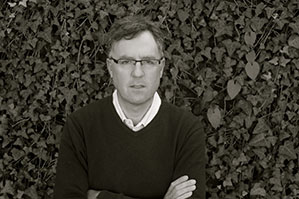
Full Professor of Organic Chemistry
joseluis.mascarenas@usc.es
Research area: Chemical Biology and Synthesis and Catalysis
José
Luis Mascareñas is full Professor in Chemistry at the University of
Santiago de Compostela (USC, Galicia, Spain) since 2005, and scientific
director of the Center for research in biological chemistry and
molecular materials (CiQUS) since 2014. He completed his PhD at the
University of Santiago in 1988, and was a postdoctoral fellow at
Stanford University (USA) under the supervision of Prof. Paul Wender
(1989-1991). He has been visiting scholar in Harvard University (USA) in
the summers of 1992 and 1995, and visiting scientist in the University
of Cambridge (UK, 2009) and the MIT (USA, 2013).
He
has supervised 41 PhD theses, published over 215 articles in peer
reviewed journals and wrote 23 patent applications (6 registered, 3 granted). He has delivered
more than 160 invited lectures. Along recent years he has received
several awards, including: Organic Chemistry award of the Spanish Royal
Society of Chemistry (RSEQ, 2009), Advanced grant of the ERC (2014),
Galician of the year "Grupo Correo Gallego" (2014), Gold medal of the
University of Santiago (2014), Gold Medal of the Spanish Royal Society
of Chemistry (2015), award of the Galicia Critic (2018), Research Medal
of the Royal Galician Academy of Sciences (2019), Proof-of-Concept
grant of the ERC (2020) and two further tech-transfer grants: AEI 'Prueba de concepto' and CaixaResearch Consolidate (2021). In 2017 he was selected as member of the
European Academy of sciences (EURASC), and Spanish responsible of
EUCHEMS in Organic Chemistry. He is member of several editorial boards
and foundations, founder/first president of the Spanish group of
Chemical Biology of the RSEQ and, since 2021, vicepresident of the RSEQ.
His
current research interests split into two programs: the discovery and
development of metal-catalyzed processes, and to a chem-biomed program
in cellular catalysis and biosupramolecular chemistry.
Senior Principal Investigators

CSIC Senior Research Scientist
fernando.lopez@csic.es
Research area: Synthesis and Catalysis
Fernando López García (A Estrada, 1975) studied Chemistry at the University of Santiago de Compostela where he obtained his degree in 1998. During his PhD (1999-2003) at the same University, under the supervision of Prof. José L. Mascareñas, he carried out two predoctoral stays at the ETH-Zürich (Prof. Erick M. Carreira) and at Yale University ( Prof. John F. Hartwig). From 2003 until 2005 he was a Marie Curie postdoctoral Fellow at the University of Groningen, under the supervision of Prof. Ben L. Feringa
In 2006, he joined the University of Santiago de Compostela under the Ramón y Cajal programme. In 2008, he became Tenured Scientist at the Spanish National Research Council (CSIC) and joined the Instituto de Química Orgánica General (IQOG). In 2009 he received the RSEQ-SIGMA-ALDRICH Young Chemists Award of the RSEQ.
Presently, he has been assigned to the Centro Singular de Investigación en Química Biolóxica e Materiais Moleculares (CIQUS), at the University of Santiago de Compostela. His research is focused on the development of new transition metal-catalyzed processes with a focus on enantioselective catalysis.
In 2006, he joined the University of Santiago de Compostela under the Ramón y Cajal programme. In 2008, he became Tenured Scientist at the Spanish National Research Council (CSIC) and joined the Instituto de Química Orgánica General (IQOG). In 2009 he received the RSEQ-SIGMA-ALDRICH Young Chemists Award of the RSEQ.
Presently, he has been assigned to the Centro Singular de Investigación en Química Biolóxica e Materiais Moleculares (CIQUS), at the University of Santiago de Compostela. His research is focused on the development of new transition metal-catalyzed processes with a focus on enantioselective catalysis.
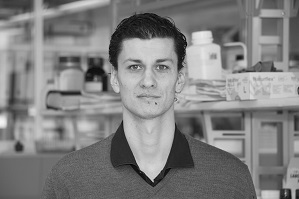
Associate Professor
moises.gulias@usc.es
Research area: Synthesis and Catalysis
Moisés Gulías studied Chemistry at University of Santiago de Compostela where he obtained his degree in 2001. He carried out his PhD studies as Xunta de Galicia Fellow at the same University under the supervisión of Prof. J. L. Mascareñas. As result, this thesis was awarded with the Extraordinary Award of the University of Santiago de Compostela. In the middle of his PhD he also did a predoctoral stay at Stanford University (USA) under the supervision of B. M. Trost.
Between 2007 and 2009 he joined the group of Prof. M. Gaunt as postdoctoral fellow for which he was awarded with a prestigious Marie-Curie grant.
In 2010 he returned to the University of Santiago de Compostela as Isidro Parga Pondal Fellow. In 2015 he was recognized with the Thieme Chemistry Journal Award and RSEQ-SIGMA ALDRICH Young Chemist Award. Then, in 2016, he became tenured professor and from 2017 he is principal investigator at the CiQUS.
His research is focused on the invention of new types of C-H functionalization reactions, asymmetric synthesis and their implementation for the synthesis of biologically active molecules.
Between 2007 and 2009 he joined the group of Prof. M. Gaunt as postdoctoral fellow for which he was awarded with a prestigious Marie-Curie grant.
In 2010 he returned to the University of Santiago de Compostela as Isidro Parga Pondal Fellow. In 2015 he was recognized with the Thieme Chemistry Journal Award and RSEQ-SIGMA ALDRICH Young Chemist Award. Then, in 2016, he became tenured professor and from 2017 he is principal investigator at the CiQUS.
His research is focused on the invention of new types of C-H functionalization reactions, asymmetric synthesis and their implementation for the synthesis of biologically active molecules.
Group Members
Previous Members

Scientific Manager
adrian.jimenez@usc.es
Research area: Chemical biology & Synthesis and Catalysis
Adrián Jiménez-Balsa was born in Vilagarcía de Arousa (Pontevedra).
He studied Chemistry at the University of Santiago de Compostela (USC), and he also received his PhD in Organic Chemistry in 2012 by the same university.
He worked abroad as a researcher for several periods, first in Cambridge (UK) but mainly in Coimbra (Portugal).
He studied Chemistry at the University of Santiago de Compostela (USC), and he also received his PhD in Organic Chemistry in 2012 by the same university.
He worked abroad as a researcher for several periods, first in Cambridge (UK) but mainly in Coimbra (Portugal).
Nowadays, he is supporting the group as Administrative & Scientific Manager.

Technical Support
tamara.vazquez.zas@usc.es
Research area: Chemical Biology
Tamara was born in 1992 in A Coruña
(Galicia). He has studied Chemistry at the University of A Coruña (UDC),
obtaining his BSc degree in 2016.
Nowadays,
he is working as a technician under the supervision of both Prof.
José Luis Mascareñas and Dr. Lara Villarino Palmaz.

Ramón y Cajal fellow
maria.tomas@usc.es
Research area: Chemical Biology
María carried out her PhD studies as FPU fellow at the University of Oviedo, under the supervision of Prof. J. Barluenga Mur and Prof. C. Valdés. During
her PhD she carried out two predoctoral stays: Bristol University, UK (supervisor: Prof. V. K. Aggarwal) and Université de
Montréal, Canada (supervisor: Prof. A. Charette). After receiving her PhD, she was awarded with a Spanish fellowship to join the group of Prof. T. Carell (University of Munich), being afterwards also awarded with an Alexander von Humboldt grant (2012) to continue her postdoctoral research.
In 2015 she joined the CiQUS (University of Santiago de Compostela) as “Juan de la Cierva - Formación” fellow, under the supervision of Prof. J. L. Mascareñas. Two years later she was awarded with a "Juan de la Cierva - Incorporación" fellowship, under Prof. Mascareñas' supervision too.
Afterwards, in 2019, she was granted with a project for young researchers (JIN) by the Ministry of Science, Innovation and Universities of Spain, which is based on bioorthogonal photocatalysis. Nowadays, she is a Ramón y Cajal fellow at CiQUS, working hand by hand with Prof. Mascareñas and his research group.
Her research is focused on the development of metal-catalyzed transformations in biological habitats, including living cells, and their implementation for bio-sensing and targeted therapy.
In 2015 she joined the CiQUS (University of Santiago de Compostela) as “Juan de la Cierva - Formación” fellow, under the supervision of Prof. J. L. Mascareñas. Two years later she was awarded with a "Juan de la Cierva - Incorporación" fellowship, under Prof. Mascareñas' supervision too.
Afterwards, in 2019, she was granted with a project for young researchers (JIN) by the Ministry of Science, Innovation and Universities of Spain, which is based on bioorthogonal photocatalysis. Nowadays, she is a Ramón y Cajal fellow at CiQUS, working hand by hand with Prof. Mascareñas and his research group.
Her research is focused on the development of metal-catalyzed transformations in biological habitats, including living cells, and their implementation for bio-sensing and targeted therapy.
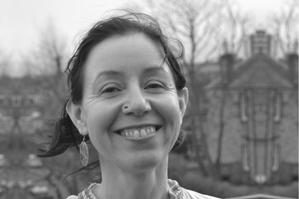
Ramón y Cajal fellow
beatriz.orosa@usc.es
Research area: Chemical Biology
Beatriz carried out her PhD studies in Plant Molecular
Biology at the University of Barcelona, under the supervision of Dr. M. Coca and Prof. B. San Segundo (CRAG). During
her PhD, she carried out a predoctoral stay at the Institute of Health Research in Santiago de Compostela, working in
human autoimmunity.
After
receiving her PhD, she moved to Prof. Ari Sadanandom’s group (Durham
University). In 2018, she started a second postdoctoral period working at Prof
Steven Spoel’s group (University of Edinburgh).
Recently, she joined the group of Prof. J. L. Mascareñas at CiQUS
(University of Santiago de Compostela) as “Ramón y Cajal” fellow.
Her
research is focused on understanding how plant immune responses are regulated
by ubiquitination, willing to exploiting this knowledge to produce disease
resistant barley through proteome engineering.
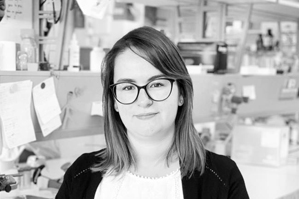
Postdoctoral researcher
lara.villarino.palmaz@gmail.com
Research area: Chemical Biology
Lara was born in Viveiro. She studied Chemistry at University of Santiago de Compostela where she received her PhD under the supervision of José L. Mascareñas and Fernando López in 2013. She carried out two stays, one stay at Harvard University and a second one at University of Toronto.
She was a Postdoctoral Researcher at University of Groningen under the supervision of J. G. Roelfes.
Currently she is a Postdoctoral Researcher at University of Santiago de Compostela under the supervision of Prof. José L. Mascareñas.
She was a Postdoctoral Researcher at University of Groningen under the supervision of J. G. Roelfes.
Currently she is a Postdoctoral Researcher at University of Santiago de Compostela under the supervision of Prof. José L. Mascareñas.
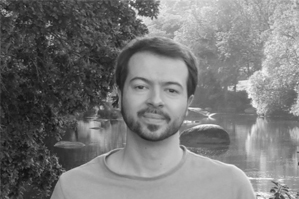
Postdoctoral fellow
carloslazaromilla@ucm.es
Research area: Synthesis and Catalysis
Carlos was born in Madrid. He studied
Chemistry and Msc. in Organic Chemistry at the Complutense University of
Madrid. He received his PhD at the same University under the supervision of
Prof. Benito Alcaide and Prof. Dr. Pedro Almendros.
Then, he carried out a one year postdoctoral
research under a POP (periodo de orientación postdoctoral) contract in
the CSIC-IQOG under Prof. Dr. Almendros' supervision too.
After working in the chemical industry, he joined
the Prof. José L. Mascareñas’ group at CiQUS-USC as a Margarita Salas postdoctoral
fellow. His current research is focused on the development of metal-catalyzed processes.
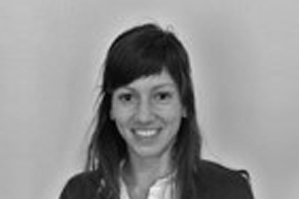
Postdoctoral researcher
celia.mayer.mayer@usc.es
Research area: Chemical Biology
Celia was born in Santiago de
Compostela where she studied Biology and a MSc at the USC. She carried out her
PhD studies in microbiology and molecular biology at the same University (2014-2018),
under the supervision of Prof. Ana Otero Casal and Dr. Manuel Romero. During
her PhD, she carried out a predoctoral stay at the Centre for Biomolecular
Sciences (University of Nottingham, UK) under the supervision of Prof. Paul
Williams.
In 2019 she was awarded with a postdoc
fellowship from Xunta de Galicia to join the Health Research Foundation
Institute of Santiago de Compostela (FIDIS). With this grant she
has worked at the National Biofilms Innovation Centre (NBIC) from the
University of Nottingham (UK), at the Laboratory for Process Engineering,
Environment, Biotechnology and Energy (LEPABE) from the University of Porto
(Portugal) and also at the Escherichia coli reference lab (LREC-FIDIS).
Recently, she has joined the group
of Prof. JL Mascareñas at CiQUS (USC) as a postdoctoral research associate.
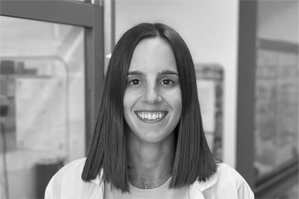
Postdoctoral researcher
albacasas.pais@usc.es
Research area: Chemical biology
Alba
studied Biology at the University of Santiago de Compostela, and
obtained her MSc in Molecular, Cellular and Genetic Biology at the
University of A Coruña. She carried out her PhD studies at the same
University as a Xunta de Galicia Fellow. Her PhD thesis, which was
mainly focused on the development and validation of small molecules
directed against an E3 ubiquitin-ligase for the treatment of colorectal
cancer, was awarded with the PhD Extraordinary Award of the University of A
Coruña. More recently, this project has received the Francisco Guitián
Ojea 2023 Award (RAGC) for best applied research work. Additionally, during
her PhD thesis she was also a beneficiary of the INDITEX-UDC
pre-doctoral stay grant, carrying out a pre-doctoral stay at the
Institute of Medical Genetics (Medical University of Vienna).
In
early 2023, she joined MetBioCat group under the supervision of Beatriz Orosa,
where she continues to do research in the field of E3 ubiquitin
ligases, with a synthetic biology perspective. At the same time, she
also supports the group in the biological aspects of other research
lines.
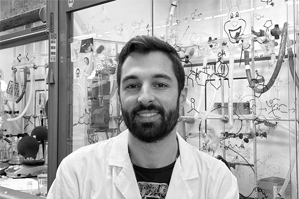
PhD Candidate
rirobal@gmail.com
Research area: Synthesis and Catalysis
Ricardo was born in 1996 at Sanxenxo
(Pontevedra). He studied Chemistry at the University of Santiago de Compostela (USC), obtaining his BSc. degree in 2018.
He has joined
our group through the "CiQUS Summer Scholarship Program", in 2017.
Afterwards, in 2019, he finished his MSc. in Organic Chemistry. The corresponding MSc. research activities were supported by the
CiQUS program "Initiation to research-Contracts".
His
research is focused on the development of new asymmetric Pd(0)
catalysts in cycloadditions to access to functionalized heterocycles.
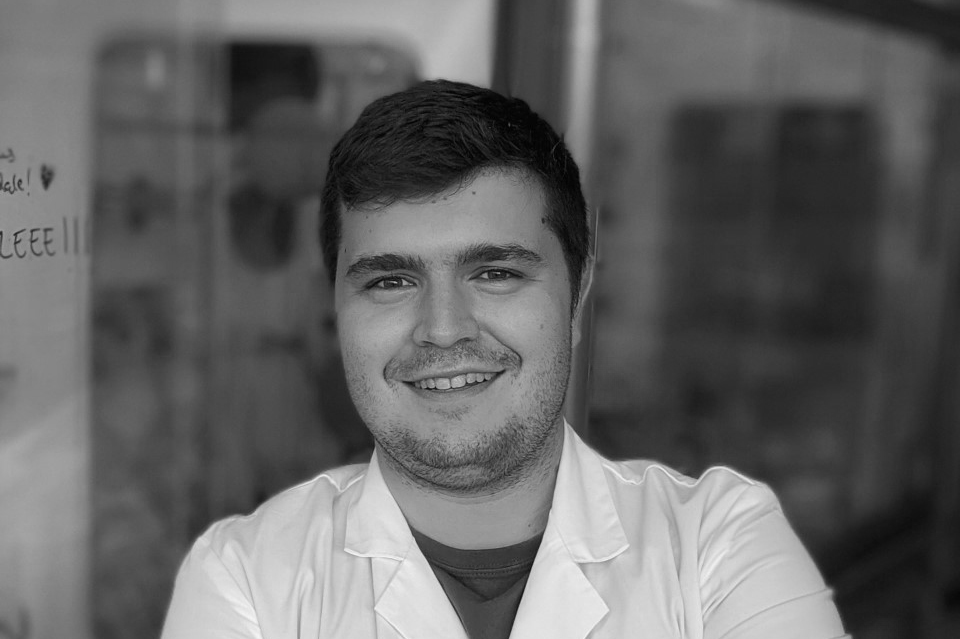
PhD Candidate
daniel.marcos@rai.usc.es
Research area: Chemical biology & Synthesis and Catalysis
Daniel was born in 1996 at Vigo
(Pontevedra). He studied Chemistry at the University of Santiago de Compostela (USC), obtaining his BSc degree in 2018.
He has joined
our group through the "CiQUS Summer Scholarship Program", in 2017.
Afterwards, in 2019, he finished his MSc. in Organic Chemistry. The corresponding MSc. research activities were supported by the
CiQUS program "Initiation to research-Contracts".
He is
currently a PhD student at the University of Santiago de Compostela
under the supervision of Prof. José Luis Mascareñas and Prof. Moisés Gulías.
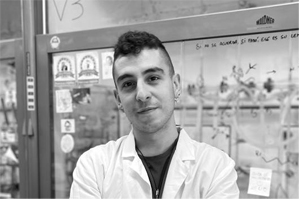
PhD Candidate
andres.arribas.domingo@usc.es
Research area: Synthesis and Catalysis
Andy was born in 1996 (Madrid). He studied BSc. in Chemistry (2018) at
Complutense University of Madrid. While enrolled in his bachelor's
degree he worked as a fellow at both IMDEA Nanoscience and IMDEA
Materials institutes.
He obtained a JAE-Intro fellowship to carry out his Master thesis in the group of Prof. Aurelio G. Csákÿ and Prof. Francisco Sánchez at CSIC, as part of his MSc. in Organic Chemistry (Complutense University of Madrid, 2019).
In 2019, he joined the group as Xunta de Galicia predoctoral fellow. Later on, he got a FPU scholarship to continue with his PhD. During summer 2021 he did a short stay (3 months) at University of Zürich (SW) under the supervision of Prof. Cristina Nevado, working on synthesis and characterization of novel Au(III) complexes.
He obtained a JAE-Intro fellowship to carry out his Master thesis in the group of Prof. Aurelio G. Csákÿ and Prof. Francisco Sánchez at CSIC, as part of his MSc. in Organic Chemistry (Complutense University of Madrid, 2019).
In 2019, he joined the group as Xunta de Galicia predoctoral fellow. Later on, he got a FPU scholarship to continue with his PhD. During summer 2021 he did a short stay (3 months) at University of Zürich (SW) under the supervision of Prof. Cristina Nevado, working on synthesis and characterization of novel Au(III) complexes.
His efforts are focused on new methodologies using Ir(I) catalysis, working under the supervision of Prof. José Luis Mascareñas and Prof. Fernando López.

PhD candidate
xulian.fernandez@rai.usc.es
Research area: Chemical biology
Xuli was born in 1996 at Tui (Pontevedra). He studied Chemistry at the University of Santiago de Compostela (USC), obtaining his BSc degree in 2019.
He has joined our group in 2018 for his final degree project.
Nowadays, he is finishing his Master in Chemistry at the Interface with Biology and Materials Science from the CiQUS (USC) and also starting his PhD under the supervision of Prof. José Luis Mascareñas and Dr. María Tomás Gamasa, at the same University.

PhD candidate
alejandro.rey.lopez@rai.usc.es
Research area: Synthesis and Catalysis
Alex was born in 1995 at Teixeiro (A
Coruña). He studied Chemistry at the University of Santiago de
Compostela (USC) obtaining his BSc degree in 2019 and, afterwards, his MSc in Organic Chemistry (2020).
He has joined our research group in 2018, for his final degree
project.
He is currently a PhD student at
the University of Santiago de Compostela under the supervision of Prof.
José Luis Mascareñas and Dr. Fernando López.
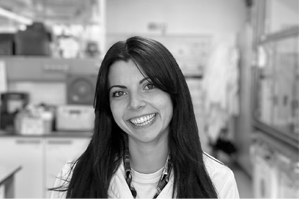
PhD candidate
cinzia.davino@rai.usc.es
Research area: Chemical Biology
Cinzia
was born in 1994 at Napoli (Italy). She studied Industrial Chemistry at
the University of Naples Federico II obtaining her BSc degree in 2017
and, afterwards, her MSc
in Science and Technology of Industrial Chemistry (2020).
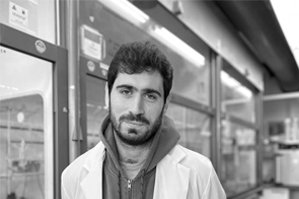
PhD candidate
jesusfernando.salgado@rai.usc.es
Research area: Chemical biology
Fernando was born
in 1997 at Santiago de Compostela. He studied Chemistry at the
University of Santiago de Compostela (USC), obtaining his BSc degree in
2020.
He has joined our research group in 2019, for his final BSc degree project.
Afterwards, he was a MSc student at the University of Santiago de
Compostela under the supervision of Prof. José Luis Mascareñas and Dr.
María Tomás, and supported by the
CiQUS program "Initiation to research-Contracts".
He currently is a predoctoral researcher also under the supervision of Prof. José Luis Mascareñas and Dr. María Tomás.

PhD candidate
ivan.huertas@rai.usc.es
Research area: Synthesis and Catalysis
Iván was born in 1998 at Rincón de la Victoria
(Málaga). He studied Chemistry at the University of Málaga (UMA)
obtaining his BSc degree in 2020.
He has joined our research group in 2020, for his final degree
project during his MSc at the University of Santiago de
Compostela. He was supported by the
CiQUS program "Initiation to research-Contracts".
He currently is a predoctoral researcher under the supervision of Prof. José Luis Mascareñas and Prof.
Moisés Gulías.
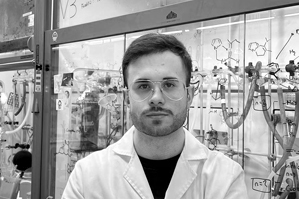
PhD candidate
pablolosada.castro@usc.es
Research area: Synthesis and Catalysis
Pablo was
born in 1999 at Santiago
de Compostela (Galicia, Spain). He studied Chemistry at
the Univeristy of Santiago
de Compostela (USC) obtaining his BSc degree in 2021. That same year, during
the corresponding final degree project, he has joined our research group. He then proceed with his MSc Thesis project at our group, supported
by the CiQUS program "Initiation to research-Contracts".
He is currently conducting
his PhD studies under the supervision of Prof. José Luis Mascareñas and Prof. Moisés
Gulías Costa at our research group.

PhD candidate
sergio.diaz.alonso@rai.usc.es
Research area: Synthesis and Catalysis
Sergio was born in 1998 at Oviedo (Asturias). He studied Chemistry at
the University of Oviedo obtaining his BSc degree in 2021. In 2021, he joined our research group for his final degree
project during his MSc at the University of Santiago de
Compostela (USC), supported by the
CiQUS program "Initiation to research-Contracts"
Nowadays, he is working as a predoctoral researcher under the
supervision of Prof. José Luis Mascareñas and Dr. Fernando López
García, supported by a "Ayuda para contratos predoctorales para la formación de doctores" of the Spanish Ministery of Science and Innovation.
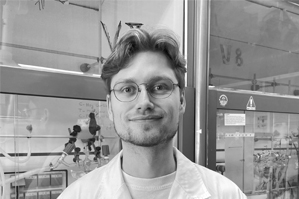
PhD candidate
leonard.gerrit@usc.es
Research area: Chemical Biology
Leo was born in 1997 in Herdecke (Germany). At a young age, he
moved to Groningen in the Netherlands, where he grew up and started his
studies at the University of Groningen. There, he obtained his Bachelor
degree in Chemistry in 2018, in which he conducted his final research
project in the group of Prof. S. Otto.
Continuing his studies in Groningen, he completed his Master degree in Catalysis and Green Chemistry in 2022, performing his Master thesis in the group of Prof. J.G. Roelfes. During his Master degree, he conducted a second research project in our research group, under the supervision of Prof. José Luis Mascareñas and Dr. María Tomás Gamasa.
After obtaining his Master degree, he joined our group to start his PhD studies in the field of Chemical Biology supervised by Prof. José Luis Mascareñas and Dr. Fernando López García.
Continuing his studies in Groningen, he completed his Master degree in Catalysis and Green Chemistry in 2022, performing his Master thesis in the group of Prof. J.G. Roelfes. During his Master degree, he conducted a second research project in our research group, under the supervision of Prof. José Luis Mascareñas and Dr. María Tomás Gamasa.
After obtaining his Master degree, he joined our group to start his PhD studies in the field of Chemical Biology supervised by Prof. José Luis Mascareñas and Dr. Fernando López García.
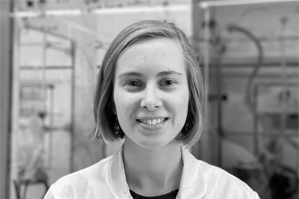
PhD candidate
laura.goicoechea.crespo@usc.es
Research area: Synthesis and Catalysis
Laura
was born in 1999 at Cabezón de la Sal (Cantabria). She studied
chemistry at the University of Oviedo, obtaining her BSc. degree in
2021. While enrolled in his Bachelor’s degree she worked in the group of Prof. Carlos Valdés thanks to a Beca de Colaboración of the Spanish Ministry of Education. Afterwards she moved to Madrid to complete her Master´s degree in Organic Chemistry (2022) at the Universidad Autónoma de Madrid, performing her Master thesis in the group of Prof. María Ribagorda.
She has joined the group in 2022 as a PhD student working under the supervision of Prof. José Luis Mascareñas and Prof. Moisés Gulías, and recently she has been granted with a FPU fellowship to pursue her predoctoral studies. Her actual research is focused on the development of new methodologies in asymmetric Pd catalysis.

PhD candidate
alejandra.vale@rai.usc.es
Research area: Chemical Biology
Alejandra was born in 1998 in Viveiro (Lugo, Galicia). She studied Biology and Chemistry at the University of Santiago de Compostela (USC) obtaining his BSc degrees in 2022. She joined our research group during the corresponding final degree projects which were carried out under the supervision of Prof. José Luis Mascareñas and Prof. José M. Martínez Costas.
She then furthered her studies with a Master in Organic Chemistry, conducting her MSc Thesis project at our group under the supervision of Prof. José Luis Mascareñas and Dr. María Tomás Gamasa, supported by the CIQUS program “Initiation to research-Contracts"
Nowaday she is a PhD candidate at our group also under the supervision of both Prof. Mascareñas and Dr. Tomás-Gamasa.
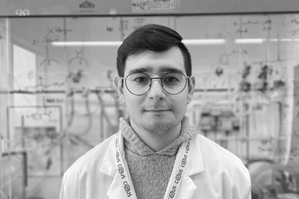
PhD candidate
alvaro.maza.baron@usc.es
Research area: Chemical Biology
Álvaro
was born in 1998, in Santander (Cantabria). He studied Chemistry and
Biology at the University of Santiago de Compostela (USC), obtaining
both Bachelor degrees in 2022. Afterwards, he furthered his studies in
Organic Chemistry at the USC, obtaining his Master degree in 2023.

PhD candidate
adrian.rivas.saborido@rai.usc.es
Research area: Chemical Biology
Adrian was born in 1996 in Padrón (Galicia). He has studied Chemistry at
the University of Santiago de Compostela (USC), obtaining his BSc
degree in 2022.
He
then completed the Master in Chemistry at the Interface with
Biology and Materials Science (ChemBioMat) at CiQUS (USC), running his MSc Thesis project at our
research group under the supervision of Prof. José Luis Mascareñas and Dr. María
Tomás Gamasa.
Nowadays, he is a PhD student at our research group, also supervised by Prof. José Luis Mascareñas and Dr. María
Tomás Gamasa.
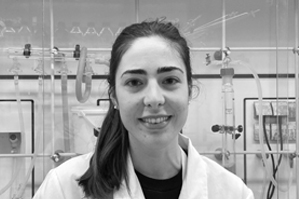
MSc student
clara.lopez.de@rai.usc.es
Research area: Chemical Biology
Clara was born in 2000 in San Sebastián (Gipuzkoa, País Vasco). She has studied
Chemistry at the University of the Basque Country (UPV/EHU), obtaining her BSc
degree in 2022. In 2021 she joined the Biomolecular Nanotechnology group at CIC biomaGUNE during
a summer internship and, the following year, she carried out her final degree
project at the same group under the supervision of Prof. Aitziber López
Cortajarena.
She has completed her Master in Chemistry at the Interface with Biology and Materials Science
(ChemBioMat) at CiQUS (USC) in 2024, running her MSc Thesis project at our
research group under the supervision of Prof. José Luis Mascareñas and Dr. Lara
Villarino Palmaz.
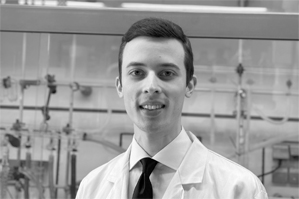
MSc student
david.montoto.pintos@usc.es
Research area: Chemical biology
David
was born in 1999 in Santiago de Compostela (A Coruña, Galicia). He
studied Biology and Chemistry at the University of Santiago de
Compostela (USC), obtaining both Bachelor’s degrees in 2023 with
extraordinary award. He joined our research group in 2022 through the “CiQUS Summer Fellowship”
program, and afterwards carried out his final degree projects under the
supervision of Prof. José Luis Mascareñas, Dr. Beatriz Orosa Puente and
Dr. María Tomás Gamasa. He also obtained a collaboration fellowship of
the Spanish Ministry of Education.
He is currently completing the Master in Chemistry at the Interface with Biology and Materials Science (ChemBioMat)
at CiQUS (USC) and running his MSc Thesis project at our research group
under the supervision of Prof. José Luis Mascareñas and Dr. María Tomás
Gamasa.

PhD candidate
sestelo@udc.es
Research area: Synthesis and Catalysis
José Pérez Sestelo studied Chemistry at the
University of Santiago de Compostela (Spain) where he got his PhD in Chemistry (1994) under the
supervision of Profs. A. Mouriño and L. Castedo and Dr. J. L. Mascareñas.
Then, during the period
1994-1996 he performed postdoctoral studies at the University of Pennsylvania
in the research group of Prof. Amos B.
Smith III, working in the synthesis of biologically active compounds, and
also at Boston College with Prof. T. Ross Kelly working in the synthesis of
molecular motors.
Afterwards, in 1997 he joined the University
of A Coruña as a postdoctoral researcher (MEC)
Nowadays he is a full Professor
at this same University, since 2018
With us:
PhD Thesis
PhD Thesis
Current position:
Full Professor, Univ. of A Coruña
Full Professor, Univ. of A Coruña

PhD candidate
amgarcia@gaintherapeutics.com
Research area: Synthesis and Catalysis
Ana M. García obtained her PhD in Organic Chemistry (1996) from
the
University of Santiago de Compostela under
the supervision of Prof. Antonio Mouriño and Prof. José Luis Mascareñas.
Afterwards, she was a post-doctoral Marie Curie Research Fellow in the group of the
Nobel Prize winner Prof. Jean-Marie Lehn at Université Louis Pasteur
(France).
Then, she developed her professional career as a senior medicinal chemist by directing research groups through the drug discovery
process for around 20 years: Karo Bio (Sweden), CNIO (Madrid), Minoryx (Barcelona) and, finally, Gain Therapeutics (Barcelona).
She is nowadays the head of research at Gain Therapeutics SA, a preclinical biotech company specializing in the discovery of new drugs for rare and CNS diseases
With us:
PhD Thesis
PhD Thesis
Current position:
Head of research, Gain Therapeutics SA
Head of research, Gain Therapeutics SA
PhD candidate
antonio.rumbo@usc.es
Research area: Synthesis and Catalysis
A. Rumbo obtained his PhD in Chemistry (1996) from
the
University of Santiago de Compostela (USC) under
the supervision of Prof. Antonio Mouriño, Prof. Luis Castedo and Prof. José Luis Mascareñas,
working on estereoselective synthesis by [5C+2C] cycloadditions
Then, he moved to the Max-Planck Institute fur Kohlenforschung during the years 1998-2000, coming back to the USC as a TMR-Marie Curie (EU, 2000-01). Right after, between 2001 and 2006, he was a Ramón y Cajal fellow at the same University.
Since 2007 he is an assistant professor of organic chemistry
at the USC
With us:
PhD Thesis
PhD Thesis
Current position:
Assistant Professor, Univ. of Santiago de Compostela
Assistant Professor, Univ. of Santiago de Compostela
PhD candidate
Research area: Synthesis and Catalysis
Francisco J. Soto Fernández obtained his PhD in Chemistry from the
University of Santiago de Compostela in 1997, under
the supervision of Prof. Luis Castedo and Prof. José Luis Mascareñas, working on the preparation of Paclitaxel abeo-taxane analogues.
Nowadays, he is a sciences (Physics & Chemistry) teacher at high school (Galicia, Spain)
With us:
PhD Thesis
PhD Thesis
Current position:
Chemistry Teacher at High School (Galicia, Spain)
Chemistry Teacher at High School (Galicia, Spain)
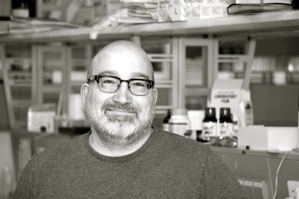
Assistant Professor
eugenio.vazquez@usc.es
Research area: Chemical Biology
M. Eugenio Vázquez (1973) graduated in Chemistry from the University of Santiago de Compostela in 1996, and obtained his PhD under the supervision of Prof. José Luis Mascareñas, working on synthetic DNA-binding peptides.
In 2001 he received the ”Human Frontier Science Program, HFSP” long-term fellowship and joined Prof. Barbara Imperiali at MIT, where he worked for three years on the development of caged compounds and fluorescent probes as tools for studying complex biological processes.
He returned to Santiago as a ”Ramón y Cajal” researcher in 2004, and received the ”Carreer Development Award” from the HFSP. He obtained his permanent position at the Organic Chemistry Department in 2010. In 2008 he received the Sigma-Aldrich Young Researchers Award of the Spanish Royal Society of Chemistry, and in 2010 he received the Lilly young researcher award.
In 2001 he received the ”Human Frontier Science Program, HFSP” long-term fellowship and joined Prof. Barbara Imperiali at MIT, where he worked for three years on the development of caged compounds and fluorescent probes as tools for studying complex biological processes.
He returned to Santiago as a ”Ramón y Cajal” researcher in 2004, and received the ”Carreer Development Award” from the HFSP. He obtained his permanent position at the Organic Chemistry Department in 2010. In 2008 he received the Sigma-Aldrich Young Researchers Award of the Spanish Royal Society of Chemistry, and in 2010 he received the Lilly young researcher award.
With us:
PhD Thesis, RyC postdoctoral researcher and Assistant Professor
PhD Thesis, RyC postdoctoral researcher and Assistant Professor
Current position:
Associate Professor, Univ. of Santiago de Compostela
Associate Professor, Univ. of Santiago de Compostela
PhD Candidate
ramon.rodriguez@galchimia.com
Research area: Synthesis and Catalysis
Juan R. Rodríguez studied Chemistry at the University of Santiago de Compostela.
He received his PhD in 2002 under the supervision of José L. Mascareñas and Luis Castedo Expósito.
Nowadays, he is the Laboratory Manager and Technicians coordinator at GalChimia (O Pino, Galicia)
He received his PhD in 2002 under the supervision of José L. Mascareñas and Luis Castedo Expósito.
Nowadays, he is the Laboratory Manager and Technicians coordinator at GalChimia (O Pino, Galicia)
With us:
PhD Thesis
PhD Thesis
Current position:
Laboratory Manager and Technicians coordinator at GalChimia (Spain)
Laboratory Manager and Technicians coordinator at GalChimia (Spain)
PhD Candidate
ana.caamano@galchimia.com
Research area: Chemical Biology
Ana M. Caamaño studied chemistry at University of Santiago de Compostela.
She received her PhD in 2002 under the supervision of José L. Mascareñas.
Nowadays, she is a Project Manager at Galchimia (O Pino, Galicia).
She received her PhD in 2002 under the supervision of José L. Mascareñas.
Nowadays, she is a Project Manager at Galchimia (O Pino, Galicia).
With us:
PhD Thesis
PhD Thesis
Current position:
Project Manager at Galchimia
Project Manager at Galchimia
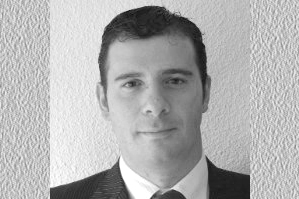
PhD Candidate
qoalex@gmail.com
Research area: Synthesis and Catalysis
Alejandro (Vigo, 1976) studied Chemistry at the University of Santiago de
Compostela where he obtained his degree in 1999.
During his PhD
(1999-2004), at the same University and under the supervision of Prof. José
L. Mascareñas, he carried out two predoctoral stays
at Boston College (Marc L. Snapper) and at Harvard University (Jared
Shaw). As a result, his thesis was recognized with the Extraordinary PhD Award
of University of Santiago de Compostela.
After his PhD, Alejandro held several positions in the industry as, for instance, Vice-president of Business
Development and Exports at Italfarmaco Group, where he was leading worldwide licensing and exportation business for the Group, or Chief Executive Officer at Lifepharma SpA.
Since January 20221, he is working a Global Director of Portfolio Management & Business Development at Insud Pharma.
With us:
PhD Thesis
PhD Thesis
Current position:
Global Director of Portfolio Management & Business Development at Insud Pharma
Global Director of Portfolio Management & Business Development at Insud Pharma
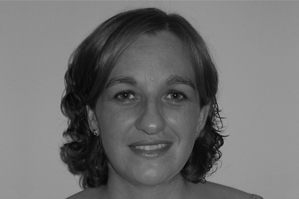
Postdoctoral Researcher
Research area: Chemical Biology
Socorro studied Chemistry at University of Santiago de Compostela.
She received her PhD by the Carlsberg Research Centre and University of Santiago de Compostela in 2002.
She joined our group as a Postdoctoral Researcher from 2003 to 2004.
She has been working as a Researcher, first in the University of Twente and afterwards at the Catalonian Institute of Nanomaterials.
She moved to the LEITAT Technological Center in 2009, where she is now a Group Leader Scientist.
She received her PhD by the Carlsberg Research Centre and University of Santiago de Compostela in 2002.
She joined our group as a Postdoctoral Researcher from 2003 to 2004.
She has been working as a Researcher, first in the University of Twente and afterwards at the Catalonian Institute of Nanomaterials.
She moved to the LEITAT Technological Center in 2009, where she is now a Group Leader Scientist.
With us:
Postdoctoral Researcher
Postdoctoral Researcher
Current position:
Group Leader at LEITAT Technological Center
Group Leader at LEITAT Technological Center
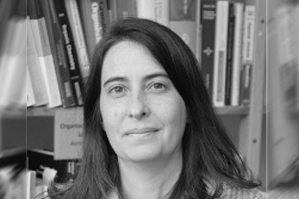
Postdoctoral Researcher
vdodero@yahoo.es
Research area: Chemical Biology
Verónica Dodero joined our group as a Postdoctoral Researcher from 2005 to 2007.
Nowadays she is an Associate Professor at Universidad Nacional del Sur (Argentina) and at Bielefeld University (Germany)
Nowadays she is an Associate Professor at Universidad Nacional del Sur (Argentina) and at Bielefeld University (Germany)
With us:
Postdoctoral Researcher
Postdoctoral Researcher
Current position:
Associate Professor
Associate Professor
Postdoctoral Researcher
timmknoerzer@gmail.com
Research area: Chemical Biology
Timm was born in USA where he studied Chemistry and received his PhD in organic chemistry by the Purdue University in 1994.
He joined our group in 2007 as Postdoctoral Researcher. By that time, he was working as an Associate Professor at Nazareth College University (USA).
Since 2010, he is a Professor at United States Air Force Academy (Colorado Springs, USA). He was also a visiting researcher at our group in two further occasions (2013 and 2017)
He joined our group in 2007 as Postdoctoral Researcher. By that time, he was working as an Associate Professor at Nazareth College University (USA).
Since 2010, he is a Professor at United States Air Force Academy (Colorado Springs, USA). He was also a visiting researcher at our group in two further occasions (2013 and 2017)
With us:
Postdoctoral Researcher
Postdoctoral Researcher
Current position:
Professor at United States Air Force Academy (Colorado Springs, USA)
Professor at United States Air Force Academy (Colorado Springs, USA)
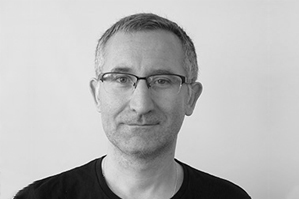
PhD Candidate
juanbautista.blanco@iqac.csic.es
Research area: Chemical Biology
Juan B. was born in Cee in 1977. He studied Chemistry at University of Santiago de Compostela.
He received his PhD in 2006 at the same University under the supervision of José L. Mascareñas. He carried out one stay at the MIT (USA) under the supervision of B. Imperiali.
After receiving his PhD, he was a Marie Curie Postdoctoral Fellow at Scripps Research Institute (USA) under the supervision of P. Dawson. Then, he was a researcher in the group of Fernando Albericio at IRB-Barcelona under the "Ramón y Cajal" programme.
Nowadays, he is a CSIC Tenuered Scientist at IQAC, Barcelona (Spain), leading the Chemical Biology group together with his partner Dr. Gemma Triola.
He received his PhD in 2006 at the same University under the supervision of José L. Mascareñas. He carried out one stay at the MIT (USA) under the supervision of B. Imperiali.
After receiving his PhD, he was a Marie Curie Postdoctoral Fellow at Scripps Research Institute (USA) under the supervision of P. Dawson. Then, he was a researcher in the group of Fernando Albericio at IRB-Barcelona under the "Ramón y Cajal" programme.
Nowadays, he is a CSIC Tenuered Scientist at IQAC, Barcelona (Spain), leading the Chemical Biology group together with his partner Dr. Gemma Triola.
With us:
PhD Thesis
PhD Thesis
Current position:
CSIC Tenuered Scientist
CSIC Tenuered Scientist

Postdoctoral Researcher
gauravorganic@gmail.com
Research area: Synthesis and Catalysis
Gaurav was born in India where he studied Chemistry and PhD.
He joined our group as Postdoctoral Researcher from 2008 to 2009. Then he moved back to India, where he started as a Hired Professor at Guru Nanak Dev University Amritsar (India).
Afterwards, he moved to the IKG Punjab Technical University (India) as an Associate Professor. Currently, he is a Professor and Head of the department of Chemical Sciences at the same univeristy.
With us:
Postdoctoral Researcher
Postdoctoral Researcher
Current position:
Professor and Head of the Chem. Sci. dept. at IKG Punjab Technical University (India)
Professor and Head of the Chem. Sci. dept. at IKG Punjab Technical University (India)
PhD Candidate
c.portela.pallares@gmail.com
Research area: Chemical Biology
Cecilia was born in Santiago de Compostela in 1979. She studied Chemistry at University of Santiago de Compostela.
She received her PhD at the same University under the supervision of José L. Mascareñas in 2007. She carried out one stay at University of Barcelona under the supervision of F. Albericio and R. Eritja. She was a Fundación Barrié Postdoctoral Fellow at University Sapienza (Rome).
Nowadays she is a researcher at Eli Lilly (Florence, Italy).
She received her PhD at the same University under the supervision of José L. Mascareñas in 2007. She carried out one stay at University of Barcelona under the supervision of F. Albericio and R. Eritja. She was a Fundación Barrié Postdoctoral Fellow at University Sapienza (Rome).
Nowadays she is a researcher at Eli Lilly (Florence, Italy).
With us:
PhD Thesis
PhD Thesis
Current position:
Researcher at Eli Lilly (Florence, Italy)
Researcher at Eli Lilly (Florence, Italy)
PhD Candidate
juandv77@gmail.com
Research area: Synthesis and Catalysis
Juan Durán studied Chemistry at University of Santiago de Compostela where he received his PhD under the supervision of José L. Mascareñas and Fernando López in 2010. He carried out one stay at University of Groningen.
Nowadays he is a science (Physics & Chemistry) teacher at high school.
Nowadays he is a science (Physics & Chemistry) teacher at high school.
With us:
PhD Thesis
PhD Thesis
Current position:
Chemistry Teacher at High School (Galicia, Spain)
Chemistry Teacher at High School (Galicia, Spain)
PhD Candidate
beatriz_trillo@hotmail.com
Research area: Synthesis and Catalysis
Beatriz studied Chemistry at University of Santiago de Compostela where she received her PhD under the supervision of José L. Mascareñas and Fernando López in 2010. She carried out one stay at Boston College Chemistry Department.
Nowadays she is a sciences (Physics & Chemistry) teacher at High School.
Nowadays she is a sciences (Physics & Chemistry) teacher at High School.
With us:
PhD Thesis
PhD Thesis
Current position:
Chemistry Teacher at High School (Galicia, Spain)
Chemistry Teacher at High School (Galicia, Spain)
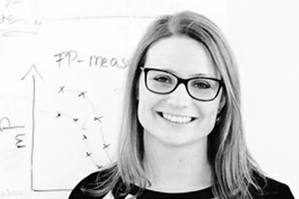
PhD Candidate
olallav@gmail.com
Research area: Chemical Biology
Olalla studied Chemistry at University of Santiago de Compostela where she received her PhD under the supervision of José L. Mascareñas and Eugenio Vázquez in 2010. She carried out one stay at Harvard University under the supervison of Gregory L. Verdine and a second one at Humboldt-Universität zu Berlin under the supervision of Oliver Seitz.
After receiving her PhD she was a Marie Curie Postdoctoral Fellow at Humboldt-Universität zu Berlin under the supervision of Oliver Seitz. Then, she moved to Philipps-Universität Marburg as a Junior Professor.
After receiving her PhD she was a Marie Curie Postdoctoral Fellow at Humboldt-Universität zu Berlin under the supervision of Oliver Seitz. Then, she moved to Philipps-Universität Marburg as a Junior Professor.
From January 2021 she is an Associate Professor of Chemical Biology (W2) at Philipps-Universität Marburg.
With us:
PhD Thesis
PhD Thesis
Current position:
Associate Professor of Chemical Biology (W2) at Philipps-Universität Marburg
Associate Professor of Chemical Biology (W2) at Philipps-Universität Marburg
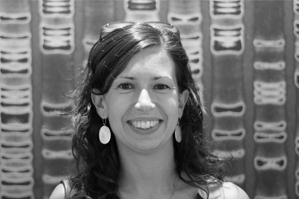
PhD Candidate
pazos.elena@gmail.com
Research area: Chemical Biology
Elena studied Chemistry at University of Santiago de Compostela where she received her PhD under the supervision of José L. Mascareñas and Eugenio Vázquez in 2012. She carried out one stay at Trinity College under the supervision of Thorfinnur Gunnlaugsson and a second one at University of Illinois at Urbana- Champaign under the supervision of Scott K. Silverman.
She was a Fundación Barrié Postdoctoral Fellow at Northwestern University under the supervision of Samuel Stupp. She was Research Officer at Medcom Advance SA in Barcelona. Afterwards, she joined the CICA (Universidade da Coruña) as a InTalent UDC-INDITEX Program Researcher.
She was a Fundación Barrié Postdoctoral Fellow at Northwestern University under the supervision of Samuel Stupp. She was Research Officer at Medcom Advance SA in Barcelona. Afterwards, she joined the CICA (Universidade da Coruña) as a InTalent UDC-INDITEX Program Researcher.
In 2019 she obtained an ERC Starting grant, and nowadays she is an assistant professor at the University of A Coruña
With us:
PhD Thesis
PhD Thesis
Current position:
Assistant Professor, Univ. of A Coruña
Assistant Professor, Univ. of A Coruña
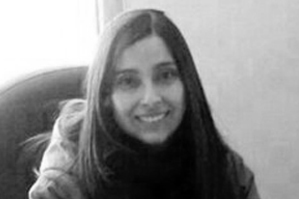
PhD Candidate
marisel.araya@umag.cl
Research area: Synthesis and Catalysis
Marisel was born in Chile where she studied Chemical Engineering.
She received her PhD at University of Santiago de Compostela under the supervision of J. Luis Castedo, José L. Mascareñas, Fernando López and Moisés Gulías in 2012.
Nowadays she is a Hired Professor at University of Magallanes (Chile).
She received her PhD at University of Santiago de Compostela under the supervision of J. Luis Castedo, José L. Mascareñas, Fernando López and Moisés Gulías in 2012.
Nowadays she is a Hired Professor at University of Magallanes (Chile).
With us:
PhD Thesis
PhD Thesis
Current position:
Hired Professor at University of Magallanes (Chile)
Hired Professor at University of Magallanes (Chile)
Postdoctoral Researcher
noequinones@hotmail.com
Research area: Synthesis and Catalysis
Noelia was born in Oviedo where she studied Chemistry and PhD.
She joined our group as a Postdoctoral Researcher from 2012 to 2013.
Nowadays she is a Researcher at Galchimia, Tres Cantos (Madrid).
She joined our group as a Postdoctoral Researcher from 2012 to 2013.
Nowadays she is a Researcher at Galchimia, Tres Cantos (Madrid).
With us:
Postdoctoral Researcher
Postdoctoral Researcher
Current position:
Researcher at Galchimia (Madrid)
Researcher at Galchimia (Madrid)
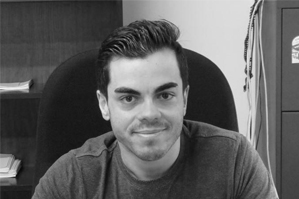
Postdoctoral Researcher
francosjavier@uniovi.es
Research area: Synthesis and Catalysis
Javier Francos was born in Oviedo in 1983. He studied Chemistry at University of Oviedo where he received his PhD in 2011 under the supervision of Prof. José Gimeno and Dr. Victorio Cadierno.
Then, he move to Glasgow, Scotland (UK), where he was a Research Assitant under the supervision of Dr. Charles O'Hara at the University of Strathlclyde.
In summer 2015 he moved back to the University of Oviedo, being awarded with a "Juan de la Cierva" fellowship for the period 2016-2017. He was also an Associate Professor at the University of Oviedo (Spain), until 2019.
Nowadays he is working as Product stewardship & Regulatory affairs at DuPont (Asturias)
After receiving his PhD, he joined our group as Postdoctoral Researcher from 2011 to 2012 under the supervision of José L. Mascareñas.
In summer 2015 he moved back to the University of Oviedo, being awarded with a "Juan de la Cierva" fellowship for the period 2016-2017. He was also an Associate Professor at the University of Oviedo (Spain), until 2019.
With us:
Postdoctoral Researcher
Postdoctoral Researcher
Current position:
Product stewardship & Regulatory affairs at DuPont (Asturias, Spain)
Product stewardship & Regulatory affairs at DuPont (Asturias, Spain)
PhD Candidate
luciasaya@gmail.com
Research area: Synthesis and Catalysis
Lucía was born in Coruña. She studied Chemistry at University of A Coruña.
She received her PhD at University of Santiago de Compostela under the supervision of José L. Mascareñas and Fernando López in 2013.
After received her PhD, she was a Postdoctoral Researcher at University of Nottingham under the supervision of Prof. Hon Wai Lam.
She is nowadays working as a researcher at Eurofins Villapharma Research, in Murcia (Spain).
She received her PhD at University of Santiago de Compostela under the supervision of José L. Mascareñas and Fernando López in 2013.
After received her PhD, she was a Postdoctoral Researcher at University of Nottingham under the supervision of Prof. Hon Wai Lam.
She is nowadays working as a researcher at Eurofins Villapharma Research, in Murcia (Spain).
With us:
PhD Thesis
PhD Thesis
Current position:
Researcher at Eurofins Villapharma Research (Murcia)
Researcher at Eurofins Villapharma Research (Murcia)

PhD Candidate
paloma.bernal@usc.es
Research area: Synthesis and Catalysis
Paloma Bernal was born in Madrid. She studied Chemistry at the Autonomous University of Madrid.
She received her PhD at the University of Santiago de Compostela under the supervision of José L. Mascareñas and Fernando López in 2014.
Afterwards, she worked as a science & innovation consultant for several companies. Since 2018, she was working as a Senior Innovation Consultant and H2020 Projects Developer at the University of La Laguna, Tenerife (Spain).
Nowadays, she is a International Grants Specialist at the Promotion Unit of the International Projects Office, UPM (Polytech Univ. of Madrid)
With us:
PhD Thesis
PhD Thesis
Current position:
International Grants Specialist at the Polytech Univ. of Madrid (UPM)
International Grants Specialist at the Polytech Univ. of Madrid (UPM)

PhD Candidate
isacalonso@hotmail.com
Research area: Synthesis and Catalysis
Isaac Alonso was born in Vigo. He studied Chemistry at the University of Vigo.
He received his PhD in 2014 under the supervision of José L. Mascareñas and Fernando López. He carried out one predoctoral stay at Leibniz-Institut für Katalyse, Rostock, Germany, 2011.
He carried out a postdoctoral stay at Max-Planck-Institut für Kohlenforschung under the supervision of Manuel Alcarazo. Afterwards, he was working as junior researcher at Galchimia.
He received his PhD in 2014 under the supervision of José L. Mascareñas and Fernando López. He carried out one predoctoral stay at Leibniz-Institut für Katalyse, Rostock, Germany, 2011.
He carried out a postdoctoral stay at Max-Planck-Institut für Kohlenforschung under the supervision of Manuel Alcarazo. Afterwards, he was working as junior researcher at Galchimia.
Then, he did a QUIR at "Hospital Provincial" in Pontevedra. And, nowadays, he is a SERGAS/ISCIII-Río Hortega researcher at, both, the Microbiology unit and INIBIC, from the University Hospital Complex of A Coruña
With us:
PhD Thesis
PhD Thesis
Current position:
SERGAS/ISCIII-Río Hortega researcher (Complexo Hospitalario Universitario A Coruña, Spain)
SERGAS/ISCIII-Río Hortega researcher (Complexo Hospitalario Universitario A Coruña, Spain)
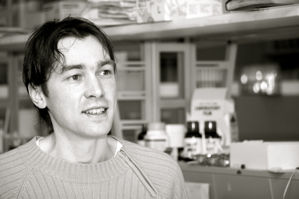
PhD Candidate
helio.ferreira@usc.es
Research area: Synthesis and Catalysis
Helio Ferreira was born in 1981 in Nazaré (Portugal); he studied Chemistry at the University of Algarve.
Helio received his PhD in 2014 at the University of Santiago de Compostela under the supervision of Prof. José L. Mascareñas and Dr. Fernando López. He carried out one predoctoral stay at the Max-Planck-Institut für Kohlenforschung in Mülheim and der ruhr (Germany) under the supervision of Nuno Maulide.
Currently, he is a working as a researcher at BLC3 - Campus de Tecnologia e Inovação, Oliveira do Hospital (Portugal).
Helio received his PhD in 2014 at the University of Santiago de Compostela under the supervision of Prof. José L. Mascareñas and Dr. Fernando López. He carried out one predoctoral stay at the Max-Planck-Institut für Kohlenforschung in Mülheim and der ruhr (Germany) under the supervision of Nuno Maulide.
Then, he carried out a postdoctoral period at the University of Lisbon under the supervision of Prof. Pedro Gois, as a FCT research fellow.
With us:
PhD Thesis
PhD Thesis
Current position:
Researcher at BLC3 - Campus de Tecnologia e Inovação (Oliveira do Hospital, Portugal)
Researcher at BLC3 - Campus de Tecnologia e Inovação (Oliveira do Hospital, Portugal)
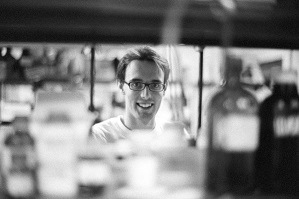
PhD Candidate
mateoisidr.sanchez@rai.usc.es
Research area: Chemical Biology
Mateo was born in 1985 in Ferrol. He studied Chemistry at the University of Santiago de Compostela.
He received his PhD in 2014 at the same University under the supervision of José L. Mascareñas and Eugenio Vázquez. He carried out three predoctoral stays: one month (CIB-CSIC Madrid, 2011) under the supervision of Jesús Jiménez Barbero, three months (Stanford University USA, 2011) under the supervision of Prof. Mattew Bogyo, three months (MIT Massachusetts, 2012) under the supervision of Prof. Alice Ting.
Currently, he is a Wellcome Trust Fellow at the University of Cambridge (UK), starting his fully independent career as group leader.
He received his PhD in 2014 at the same University under the supervision of José L. Mascareñas and Eugenio Vázquez. He carried out three predoctoral stays: one month (CIB-CSIC Madrid, 2011) under the supervision of Jesús Jiménez Barbero, three months (Stanford University USA, 2011) under the supervision of Prof. Mattew Bogyo, three months (MIT Massachusetts, 2012) under the supervision of Prof. Alice Ting.
He carried out one first postdoctoral stay at the Massachusetts Institute of Technology (MIT) under the supervision Prof. Alice Ting. He then moved, as postdoctoral researcher, to Stanford University pursuing a scientific carrer also under Prof. Ting supervision. Afterwards, he was a Researcher Associate at Tom Ellis group, Imperial College (London).
Currently, he is a Wellcome Trust Fellow at the University of Cambridge (UK), starting his fully independent career as group leader.
With us:
PhD student
PhD student
Current position:
Wellcome Trust Fellow at Univ. of Cambridge (UK)
Wellcome Trust Fellow at Univ. of Cambridge (UK)

PhD Candidate
j.mosquera@tue.nl
Research area: Chemical Biology
Jesús was born in Arzúa in 1984. He studied Chemistry at the University of Santiago de Compostela.
He received his PhD at the University of Santiago de Compostela under the supervision of José L. Mascareñas and M. Eugenio Vázquez. He carried out one predoctoral stay at University of Cambridge under the supervision of Jonathan Nitschke.
After defending his PhD Thesis he moved to the University of Cambridge, where he was a postdoctoral researcher at J. Nitschke group. Afterwards, he joined the CIC BiomaGUNE (San Sebastián) under the supervision of Prof. Liz Marzan, as a Juan de la Cierva Fellow. And finally he was granted with a H2020-MSCA-IF-2017 fellowship under the supervision of Prof. Meijer (Eindhoven University of Technology).
Nowadays, he is a Ramon y Cajal fellow at the CICA research center, University of A Coruña (UDC), Spain).
With us:
PhD Candidate
PhD Candidate
Current position:
Ramon y Cajal fellow, CICA-UDC (A Coruña, Spain)
Ramon y Cajal fellow, CICA-UDC (A Coruña, Spain)
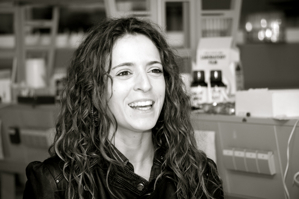
PhD Candidate
cristina.penas@usc.es
Research area: Chemical Biology
Cristina was born in Lugo in 1987. She studied Chemistry at the University of Santiago de Compostela.
She received her PhD in 2015 at the same University under the supervisión of José L. Mascareñas and Eugenio Vázquez.
Nowadays, she is a sciences (Physics & Chemistry) teacher at high school (Galicia, Spain).
She received her PhD in 2015 at the same University under the supervisión of José L. Mascareñas and Eugenio Vázquez.
Nowadays, she is a sciences (Physics & Chemistry) teacher at high school (Galicia, Spain).
With us:
PhD Student
PhD Student
Current position:
Chemistry Teacher at High School (Galicia, Spain)
Chemistry Teacher at High School (Galicia, Spain)
Postdoctoral Researcher
nataliacuradodianez@gmail.com
Research area: Chemical Biology
Natalia studied Chemistry at the University of Seville, getting her PhD at the University of Seville - CSIC. She carried out a predoctoral stay at the MIT (USA)
under the supervision of
Prof. Stephen J. Lippard. In 2017 she received the RSEQ award to the best 2015-16 Doctoral Thesis (Regional Section of Western Andalusia).
After getting her PhD, she joined our group as Postdoctoral Researcher from April 2016 to November 2016.
After getting her PhD, she joined our group as Postdoctoral Researcher from April 2016 to November 2016.
Then, she was granted with a Fundación
Alfonso Martín Escudero fellowship and worked
as Research Fellow at Brooklyn College (CUNY, New York) in collaboration
with Memorial Sloan Kettering Cancer Center, under the supervision of Dra. María Contel (2017-2018).
Nowadays she is preparing the exam to become a public servant in Education.
With us:
Postdoctoral researcher
Postdoctoral researcher
Current position:
PhD
PhD
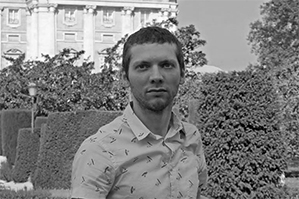
Postdoctoral Researcher
cezar.comanescu@upb.ro
Research area: Synthesis and Catalysis
Cezar-Catalin Comanescu studied PhD
at Politehnica University of Bucharest, Romania under the supervision of Prof. Cornelia
Guran. He carried out a predoctoral stay at Universita Degli Studi di Padova
(Italy) under the supervision of Prof. Giovanni Principi. The PhD work focused
on synthesis and characterization of novel ordered mesoporous materials and
their application in catalysis and hydrogen storage.
After receiving his PhD, he carried out a 3 year postdoctoral stage at University of Notre Dame, Indiana, USA, under supervision of Prof. Vlad Iluc. The postdoctoral research centered on synthesis and reactivity studies of palladium carbene complexes and various E-H (E=B, C, Si, Ge) bond activation and their catalytic implications.
He joined the group as a Postdoctoral Researcher at the University of Santiago de Compostela under the supervision of Prof. José L. Mascareñas and Dr. Moisés Gulías.
After receiving his PhD, he carried out a 3 year postdoctoral stage at University of Notre Dame, Indiana, USA, under supervision of Prof. Vlad Iluc. The postdoctoral research centered on synthesis and reactivity studies of palladium carbene complexes and various E-H (E=B, C, Si, Ge) bond activation and their catalytic implications.
He joined the group as a Postdoctoral Researcher at the University of Santiago de Compostela under the supervision of Prof. José L. Mascareñas and Dr. Moisés Gulías.
Nowadays he is a assistant professor at the University Politehnica of Bucharest
With us:
Postdoctoral Researcher
Postdoctoral Researcher
Current position:
Assistant Professor at the University Politehnica of Bucharest
Assistant Professor at the University Politehnica of Bucharest
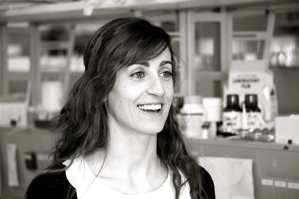
PhD Candidate
noelia.casanova@usc.es
Research area: Synthesis and Catalysis
Noelia Casanova was born in Orense. She studied Chemistry and MsC at the University of Santiago de Compostela.
She has joined our research group to pursue an academic career. In 2015 she received the SusChem Predoc Mestrelab Award. Afterwards, in 2017, she received her PhD under the supervision of Prof. José L. Mascareñas and Prof. Moisés Gulías. This same year she obtained the 2017 Lilly Award for predoctoral researchers.
She has joined our research group to pursue an academic career. In 2015 she received the SusChem Predoc Mestrelab Award. Afterwards, in 2017, she received her PhD under the supervision of Prof. José L. Mascareñas and Prof. Moisés Gulías. This same year she obtained the 2017 Lilly Award for predoctoral researchers.
Then, in 2018, she has been granted under the Xunta de Galicia program for postdoctoral researchers, while she was working as a postdoctoral researcher under the supervision of Dr. Robert Phipps, University of Cambridge (UK).
In November 2021, she joined Prof. Fernando Langa's group at the University of Castilla-La Mancha, Toledo (Spain), as a postdoctoral researcher.
With us:
PhD Student
PhD Student
Current position:
Postdoctoral researcher at the University of Castilla-La Mancha, Toledo (Spain)
Postdoctoral researcher at the University of Castilla-La Mancha, Toledo (Spain)
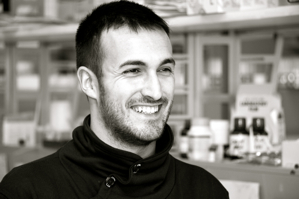
PhD Candidate
jaime.fernandez@usc.es
Research area: Synthesis and Catalysis
Jaime
Fernández was
born in 1988 in Madrid. He studied Chemistry and
MSc at the University of Santiago de Compostela.
He received his PhD at
the same University under the supervision of Prof. José L. Mascareñas
and Dr. Fernando López. During his doctoral studies, he carried out one predoctoral stay at the University of Manchester under the supervision
of Prof. Igor Larrosa.
He then started a chemistry career in industry, working first as junior researcher and lab leader at Eurofins Villapharma
Research, in Murcia (Spain), and afterwards as a R+D chemist at Galchimia, in Touro (Galicia).
Nowadays he is working in product sustainability at Zara, Inditex (Galicia).
With us:
PhD Student
PhD Student
Current position:
Product sustainability manager at Zara, Inditex (A Coruña, Spain)
Product sustainability manager at Zara, Inditex (A Coruña, Spain)
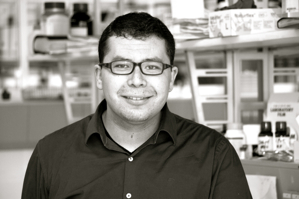
PhD Candidate
rnelson@ucn.cl
Research area: Synthesis and Catalysis
Ronald Nelson was born in 1986 in Antofagasta (Chile). He studied Chemistry and Pharmacy at Catholic University of North Chile, graduating under the supervision of Prof. Víctor Kesternich in 2011.
In 2012 he joined our group with a CONICYT fellowship (Chile) as a PhD student under the supervision of Prof. José L. Mascareñas and Dr. Fernando López.
He received his Advanced Chemistry MSc degree in 2013. He defended his PhD thesis, entitled "Cycloadittions in alenedienic systems catalyzed
by Gold and Platinum complexes. Usage in the Englerin A total synthesis", in October 2017. Afterwards, he was a postdoctoral researcher at CiQUS, also under the
supervision of Prof. José L. Mascareñas and Dr. Fernando López.
In 2019 he returned to Chile with a FONDECYT 2019 Postdoc fellow at
Catholic University of North Chile. Nowadays he is a Hired Professor at
this same University, since 2020
With us:
PhD Student & Postdoctoral researcher
PhD Student & Postdoctoral researcher
Current position:
Hired Professor at Catholic University of North (Chile)
Hired Professor at Catholic University of North (Chile)
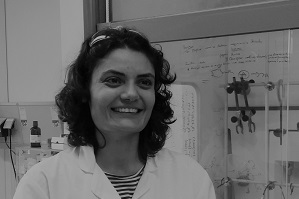
Postdoctoral Researcher
catarina.baptista@usc.es
Research area: Synthesis and Catalysis
Catarina
Rodrigues finished her M.Sc degree in Chemistry at Instituto Superior Técnico
(UTL, Lisbon, Portugal) in 2007. In the same year she entered to the
pharmaceutical company Alfama, Lda. as a research chemist, working on organic
and analytical chemistry.
In 2013, she completed her Ph.D. in Synthesis and Photochemical Characterization of Multiphoton Absorbing Chromophores under supervision of Professor Carlos Afonso (iMed, FFUL) and Professor Gaspar Martinho (IST, UL).
She did a two-year postdoc (2015-2016) on the Valorization of Natural Resources under supervision of Prof. Carlos Afonso (iMed, FFUL) and Prof. Nuno Maulide (Univ. Vienna, Austria), with a 6 month stay in University of Vienna.
In 2013, she completed her Ph.D. in Synthesis and Photochemical Characterization of Multiphoton Absorbing Chromophores under supervision of Professor Carlos Afonso (iMed, FFUL) and Professor Gaspar Martinho (IST, UL).
She did a two-year postdoc (2015-2016) on the Valorization of Natural Resources under supervision of Prof. Carlos Afonso (iMed, FFUL) and Prof. Nuno Maulide (Univ. Vienna, Austria), with a 6 month stay in University of Vienna.
In
February 2017 she joined Prof. Mascareñas group, for two years, as a Postdoctoral researcher
within the International Postdoctoral Program 2016 from Campus Vida Research
Centers Network.
Afterwards, once finished her postdoctoral stage, she left our research group to pursue his postdoctoral career.
With us:
Postdoctoral Researcher
Postdoctoral Researcher
Current position:
PhD
PhD
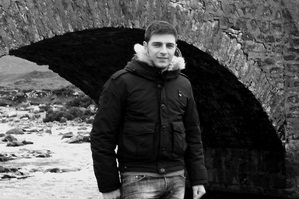
PhD Candidate
paolo.destito@usc.es
Research area: Chemical Biology
Paolo Destito was born in Italy, 1988. He studied Chemistry and MsC at the University of Calabria (Cosenza-Italy).
He carried out one stay at the Institute of Medical Sciences, Aberdeen (Scotland, UK) under the supervision of Professor Matteo Zanda (University of Aberdeen) and Professor Giovanni Sindona (University of Calabria).
He received his PhD, under the supervision of Prof. José L. Mascareñas and Dr. Fernando López, in February 2019.
Nowadays he is a Research Chemist at Galchimia (O Pino, A Coruña)
With us:
PhD Student
PhD Student
Current position:
Research Chemist at Galchimia (Galicia, Spain)
Research Chemist at Galchimia (Galicia, Spain)
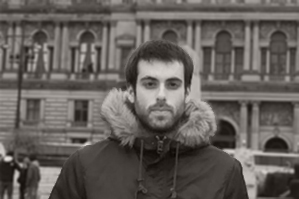
Postdoctoral Researcher
cibran.perez.gonzalez@usc.es
Research area: Chemical Biology
Cibrán
Pérez graduated in Chemistry at the Universidade de Santiago de Compostela
and then he carried out his PhD research in Biophysics at the University of
St Andrews, under the supervision of Dr. Carlos Penedo.
Nowadays, he is a sciences (Physics & Chemistry) teacher at high school (Galicia, Spain).
He joined our group in 2017 as a Postdoctoral Researcher at CiQUS, under the supervision of Prof. José Luis Mascareñas. Then, he was working as a postdoctoral researcher at biophyschem group, CiQUS (University of Santiago de Compostela)
Nowadays, he is a sciences (Physics & Chemistry) teacher at high school (Galicia, Spain).
With us:
Postdoctoral Researcher
Postdoctoral Researcher
Current position:
Chemistry Teacher at High School (Galicia, Spain)
Chemistry Teacher at High School (Galicia, Spain)
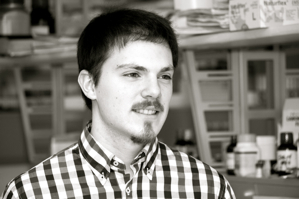
PhD candidate
david.fernandez.fernandez@usc.es
Research area: Synthesis and Catalysis
David grew up in Lugo, Galicia, before moving to Santiago de Compostela
for his Bachelor's degree at USC. There he joined the lab of
Professor Mascareñas where he obtained his MSc.
In July 2019, he received his PhD under the supervision of Prof.
Mascareñas, Prof. Gulías and Dr. López focused on
metal-catalyzed hydrocarbonation and cycloaddition reactions
based on C–H activation strategies.
Then, he joined MacMillan lab (Princeton University, USA) as a postdoctoral researcher, funded by the Xunta de Galicia postdoctoral program.
Nowadays, he is a process chemist at Pfizer, USA.
With us:
MSc Student, PhD Student and Postdoctoral Researcher
MSc Student, PhD Student and Postdoctoral Researcher
Current position:
Process chemist at Pfizer (USA)
Process chemist at Pfizer (USA)
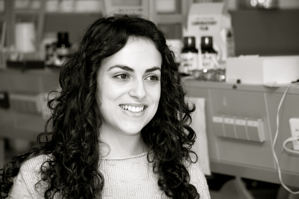
PhD Candidate
renata.calo@rai.usc.es
Research area: Chemical Biology
Renata Calo was born in Boiro in 1991. She studied Chemistry and MsC at the University of Santiago de Compostela.
In December 2019, she received her PhD Student at the same University under the supervision of Prof. José L. Mascareñas and Prof. Eugenio Vázquez.
In December 2019, she received her PhD Student at the same University under the supervision of Prof. José L. Mascareñas and Prof. Eugenio Vázquez.
Nowadays, she is a sciences (Physics & Chemistry) teacher at high school (Galicia, Spain)
With us:
MSc Student and PhD Student
MSc Student and PhD Student
Current position:
Chemistry Teacher at High School (Galicia, Spain)
Chemistry Teacher at High School (Galicia, Spain)
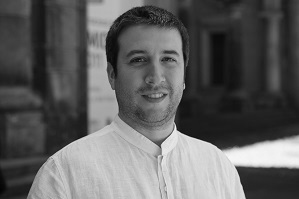
Postdoctoral Researcher
miguel.martinez@usc.es
Research area: Chemical biology & Synthesis and Catalysis
Miguel Martínez Calvo studied PhD at the University of Santiago de
Compostela under the supervision of Prof. Manuel R. Bermejo. He carried
out two predoctoral stays at University of Pavia (Italy) under the
supervision of Prof. Luigi Fabbrizzi and Prof. Luigi Casella.
After receiving his PhD, he was awarded with a fellowship to joing Prof. Thorri Gunnlaugsson in Trinity College Dublin (Republic of Ireland).
After receiving his PhD, he was awarded with a fellowship to joing Prof. Thorri Gunnlaugsson in Trinity College Dublin (Republic of Ireland).
He was a "Juan de la Cierva" fellow and Postdoctoral Researcher at the University of Santiago
de Compostela under the supervision of Prof. José L. Mascareñas. Then, he moved to the University of A Coruña as "Beatriz Galindo" Distinguished Researcher.
Nowadays, he is an Assistant Professor at the University of Santiago de Compostela (Spain)
With us:
"Juan de la Cierva" fellow and Postdoctoral Researcher
"Juan de la Cierva" fellow and Postdoctoral Researcher
Current position:
Assistant Professor at the University of Santiago de Compostela (Spain)
Assistant Professor at the University of Santiago de Compostela (Spain)

Postdoctoral Researcher
jose.rodriguez.couceiro@usc.es
Research area: Chemical Biology
José Couceiro obtained his PhD by the University of Salamanca (Microbiology and Genetics). He carried out one predoctoral stay at Estatal University of Pennsylvania.
After receiving his PhD, he was awarded with a fellowship to join the SWITCH laboratory, Flanders Institute for Biotechnology-K.U. Leuven, at Leuven (Belgium).
In 2015 he joined our group as a Postdoctoral Researcher at the University of Santiago de Compostela under the supervision of Prof. José L. Mascareñas.
After receiving his PhD, he was awarded with a fellowship to join the SWITCH laboratory, Flanders Institute for Biotechnology-K.U. Leuven, at Leuven (Belgium).
In 2015 he joined our group as a Postdoctoral Researcher at the University of Santiago de Compostela under the supervision of Prof. José L. Mascareñas.
Nowadays he is launching his own company in Life Sciences, Arnigal Cultivos.
With us:
Postdoctoral Researcher
Postdoctoral Researcher
Current position:
Entrepreneur (Galicia, Spain)
Entrepreneur (Galicia, Spain)
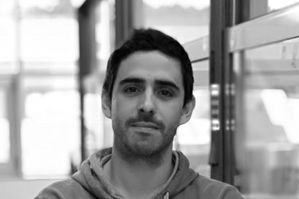
"Juan de la Cierva" Fellow
christian.vidal@usc.es
Research area: Chemical biology & Synthesis and Catalysis
Cristian Vidal Vides studied PhD at the University of Oviedo under the supervision of Joaquín García Álvarez, a "Ramón y Cajal" fellow, and Prof. Victorio Cadierno.
Then, he joined our group as a Postdoctoral Researcher, working under the supervision of Prof. José L. Mascareñas (CiQUS, University of Santiago de Compostela). Afterwards, and between Feb-2019 and Oct-2020, he was a Postdoctoral fellow under the "Juan de la Cierva" program.
Nowadays he is a MSL (Medical Scientific Liason) at The Janssen Pharmaceutical Company of Johnson & Johnson.
With us:
Postdoctoral researcher & "Juan de la Cierva" Fellow
Postdoctoral researcher & "Juan de la Cierva" Fellow
Current position:
Medical Scientific Liason (MSL) at Janssen
Medical Scientific Liason (MSL) at Janssen
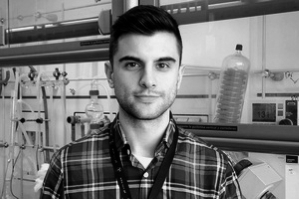
PhD candidate
ivan.varela.sanda@usc.es
Research area: Synthesis and Catalysis
Iván Varela was born in 1990 in Santiago de Compostela. He studied Chemistry and MSc at the University of Santiago de Compostela.
In July 2019, he received his PhD at the same University under the supervision of Prof. José L. Mascareñas and Dr. Fernando López. Afterwards, he was a postdoctoral researcher at CiQUS, also under the supervision of Prof. José
L. Mascareñas.
Nowadays, he is a sciences (Physics & Chemistry) teacher at high school (Galicia, Spain). He is also working as a freelance scientific disseminator.
With us:
PhD Student and Postdoctoral Researcher
PhD Student and Postdoctoral Researcher
Current position:
Chemistry Teacher at High School (Galicia, Spain) and Freelance scientific disseminator
Chemistry Teacher at High School (Galicia, Spain) and Freelance scientific disseminator
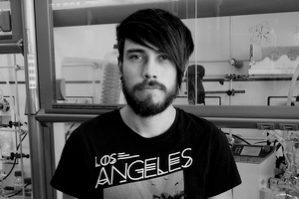
PhD candidate
felipeignacio.verdugo@rai.usc.es
Research area: Synthesis and Catalysis
Felipe Verdugo was born in 1985 in Talca (Chile). He studied Chemistry at Catholic University of North Chile.
In
2014 he joined our group with a CONICYT fellowship as a MSc student.
In June 2020, he received his PhD at the University of Santiago de Compostela, under the supervision of Prof. José L. Mascareñas and Dr. Fernando López.
In 2021 he returned to Chile as FONDECYT 2020 Postdoctoral fellow at University of Concepción (Chile). Nowadays he is a Hired Professor at
this same University, since 2022
With us:
PhD Student and Postdoctoral Researcher
PhD Student and Postdoctoral Researcher
Current position:
Hired professor at University of Concepción (Chile)
Hired professor at University of Concepción (Chile)
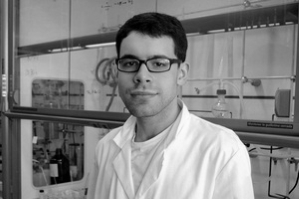
PhD candidate
davidcm992@gmail.com
Research area: Synthesis and Catalysis
David Cagiao was born in A Coruña. He studied Chemistry and MSc at the University of Santiago de Compostela.
He defended his PhD at the same university under the supervision of Prof. José L. Mascareñas and Dr. Fernando López, May 2021.
Afterwards, during a short postdoctoral stage, he left our research group in August 2022 to pursue his postdoctoral career.
With us:
PhD Student and Postdoctoral researcher
PhD Student and Postdoctoral researcher
Current position:
PhD
PhD
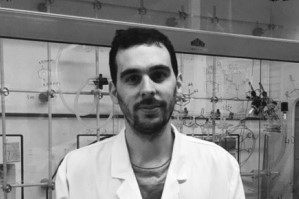
Postdoctoral researcher
marc.font@usc.es
Research area: Synthesis and Catalysis
Marc studied
Chemistry at the University of Girona, where he was awarded his MChem in 2011.
In 2015 he earned his PhD in Chemistry for studies focused on the elucidation
of the mechanisms of coinage metal-catalysed cross-coupling reactions under the
guidance of Dr Xavi Ribas and Dr Miquel Costas. His PhD studies included a
research period within Prof John F. Hartwig’s team at the University of
California at Berkeley.
He then joined the group of Prof Igor Larrosa at the University of Manchester as a Marie Curie Postdoctoral fellow to develop novel strategies towards the selective C–H bond functionalization of arenes.
He then joined the group of Prof Igor Larrosa at the University of Manchester as a Marie Curie Postdoctoral fellow to develop novel strategies towards the selective C–H bond functionalization of arenes.
In 2017 he joined
Prof. José L. Mascareñas’ group pursuing Postdoctoral work on the development
of transition metal-catalysed annulation reactions via C–H bond
functionalization. In 2019 he joined the "Juan de la Cierva" program as an "incorporación" postdoctoral fellow, also under the supervision of Prof. Mascareñas.
Nowadays, he is working as a grants consultant at ThePaperMill (Parc Científic, Barcelona)
With us:
Postdoctoral Researcher & "Juan de la Cierva" fellow
Postdoctoral Researcher & "Juan de la Cierva" fellow
Current position:
Grants consultant at ThePaperMill
Grants consultant at ThePaperMill

PhD Candidate
borja.cendon@rai.usc.es
Research area: Synthesis and Catalysis
Borja was born in 1994 in Pontevedra. He studied Chemistry (BSc and
MSc) at the University of Santiago de Compostela. He joined the group in
2015 as an undergraduate, thanks to a collaboration grant by the MECD
(Spanish Ministry of Education, Culture and Sport).
In 2017, he was awarded with an Accésit at the Arquímedes prizes by the MECD (Spain). These recognitions are given to the best sciencific works during bachelor and/or master degree/s at national level.
He then started his predoctoral studies at the same university thanks to a FPI fellowship (MINECO), associated to one of the Prof. Moisés Gulías research projects. Over summer 2019 he did a short stay (3 months) at the Eindhoven University of Technology (NL) under the supervision of Dr. Timothy Noël, working at photochemical processes in continuous flow reactors.
In June 2022, he has successfully defended his PhD Thesis, entitled "Assembly of azaheterocycles via transition metal-catalyzed annulations involving the activation of C-H bonds" and carried out under the supervision of Prof. José Luis
Mascareñas and Prof. Moisés Gulías.
Nowadays, he is a R&D chemist at Agomab Therapeutics.
With us:
PhD Student
PhD Student
Current position:
R&D Chemist at Agomab Therapeutics
R&D Chemist at Agomab Therapeutics

PhD candidate
soleaay@gmail.com
Research area: Chemical Biology
Soraya was born in Puerto de Sagunto, Valencia. She studied Biotechnology at the Polytechnic University of Valencia.
Nowadays she is working as MSL (Medical Scientific Liason) at The Janssen Pharmaceutical Company of Johnson & Johnson.
She then joined our research group for conducting doctoral studies
on the frontier of biology and chemistry. During this period she
achieved excelent scientific results which have been highlighted by
several acknowledgements: the Lilly research award for PhD students in 2021, the RSEQ-GEQB best thesis award 2021 and the Honourable mention of the 2022 IUPAC-Solvay International Award for Young Chemists
She has defended her PhD at the University of Santiago de
Compostela under the supervisión of Prof. José L. Mascareñas, in April
2021. Right afterwards she has been conducting postdoctoral research
also at Prof. Mascareñas group being, by that time, granted with the Juan de
la Cierva - Formación fellowship 2021.
With us:
PhD Student and Postdoctoral fellow
PhD Student and Postdoctoral fellow
Current position:
Medical Scientific Liason (MSL) at Janssen
Medical Scientific Liason (MSL) at Janssen
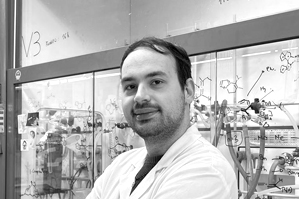
PhD candidate
xandrovp@gmail.com
Research area: Synthesis and Catalysis
Xandro was born in 1994 at Lugo (Galicia). He studied the BSc in Chemistry at
the University of Santiago de Compostela (USC), being awared with the
Outstanding Award for the highest grades. He continued his chemistry studies (MSc)
at the same University, joining our research group in 2016.
He was then a PhD candidate under the supervision of Prof. José Luis
Mascareñas and Prof. Moisés Gulías, and he was granted with a FPU fellow to pursue with his research career, also at the USC. During his predoctoral stage, he carried out one predoctoral
stay (3 months) at the University of Stockholm, under the supervision of
Prof. Abraham Mendoza.
With us:
MSc student, PhD Student and Postdoctoral researcher
MSc student, PhD Student and Postdoctoral researcher
Current position:
PhD
PhD
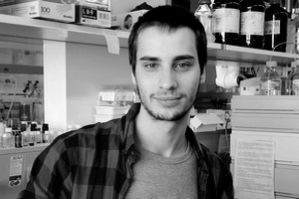
PhD candidate
joanmiguel13@gmail.com
Research area: Chemical Biology
Joan was born in 1993 in Barcelona. He studied Chemistry at Autonomous University of Barcelona.
In July 2022, he did successfully defendend his PhD Thesis "Transition Metal-Catalyzed Annulations in Biological Media" under the supervision of Prof. José L. Mascareñas and Dra. María Tomás Gamasa.
He joint the group at 2015, as a summer research stay fellow (first year of this CiQUS programme), followed by his MSc and PhD studies at the University of Santiago de Compostela, also at MetBioCat group.
He left our research group in August 2022 to pursue his postdoctoral career
With us:
MSc student, PhD Student and Postdoctoral researcher
MSc student, PhD Student and Postdoctoral researcher
Current position:
PhD
PhD
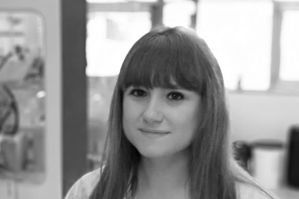
Postdoctoral researcher
sara.gutierrez.hernandez@usc.es
Research area: Chemical biology
Sara studied her PhD at the
University of Alcalá under the supervision of Prof. Juan J. Vaquero and
Dr. David Sucunza. As a result, her thesis was awarded with the
Extraordinary Award of the University of Alcalá. During
her PhD she carried out a predoctoral stay at the Scripps Research
Institute (USA) under the supervision of Prof. Phil Baran.
Then, she worked as a Postdoctoral Researcher in the
ESTEVE-ICIQ joint unit at the Institute of Chemical Research of
Catalonia for 10 months. She also spent three months at the University
of Oxford working as a Postdoctoral Research Assistant
under the supervision of Prof. Paul Brennan.
In 2019, she joined our group at the
University of Santiago de Compostela to work in a project funded by the Interreg VA España-Portugal program (POCTEP). Afterwards, she continued her academic career as Postdoctoral Researcher in the same institution also under the supervision of Prof. José
L. Mascareñas.
Nowadays she is working as Advisor-Research at the pharmaceutical Eli Lilly and Company, in Madrid (Spain)
With us:
Postdoctoral researcher
Postdoctoral researcher
Current position:
Advisor-Research at Eli Lilly and Company, Madrid (Spain)
Advisor-Research at Eli Lilly and Company, Madrid (Spain)

PhD Candidate
alejandro.gutierrez@rai.usc.es
Research area: Chemical Biology
Alejandro
was born in 1995, in Santa Cruz de Tenerife (Canary Island).
He studied Chemistry at the University of La Laguna (BSc, 2017) and, while enrolled in his bachelor, he did an internship as CiQUS Summer Fellow in our group (2016). In 2018, he received his MSc in
Organic
Chemistry at the University of Santiago de Compostela.
He was then conducting his PhD studies at our group under the supervision of Prof. Mascareñas and Dr. López, enrolled in the Chemistry PhD programme and granted with a FPU fellowship. He successfully defended his PhD Thesis on March 30th, 2023
Nowadays he is working in the pharma industry for AstraZeneca (Sweden) as Postdoctoral Researcher.
With us:
MSc and PhD Student
MSc and PhD Student
Current position:
Postdoctoral researcher at AstraZeneca
Postdoctoral researcher at AstraZeneca
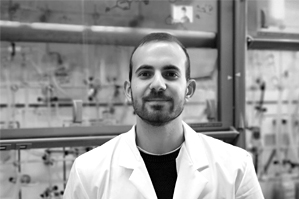
PhD Candidate
edudaconcepcion@gmail.com
Research area: Synthesis and Catalysis
Edu was
born in Mos (Pontevedra), in 1995. He obtain his B.Sc. in Chemistry
(2017) and M.Sc. in Chemical Research and Industrial Chemistry (2018) at the University
of Vigo. During the Summer of 2017 he joined the research group of Dr. Marcos García Suero at ICIQ as a "Summer Fellow".
He has successfully defended his PhD thesis in July 2023 at the University of Santiago de
Compostela, under the supervision of Prof. José Luis Mascareñas and Prof.
Fernando López.
With us:
PhD Student
PhD Student
Current position:
PhD
PhD
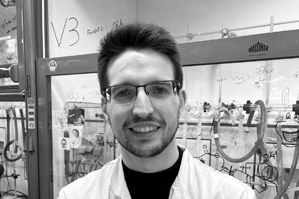
PhD Candidate
josemanuel.gonzalez.gonzalez@usc.es
Research area: Synthesis and Catalysis
Jose
was born in Cangas del Narcea (Asturias), in 1995. He grew up in Oviedo, where
he studied B.Sc. in Chemistry (2017) and also M.Sc. in Organic and Inorganic
Chemistry (2018) under the supervision of Prof.
Félix Rodríguez and Prof. Francisco Javier Fañanás, both at the University of Oviedo. During the summer of 2017
he joined the research group of Prof. Rubén Martín at ICIQ as a "Summer Fellow".
Then, he joined our group for carrying out his predoctoral studies. Over the summer of 2021 he carried
out a predoctoral stay at the Scripps Research
Institute (California, USA) under the supervision of Prof. Keary Engle,
where he worked on Nickel-catalyzed carboamination reactions.
He has successfully defended his PhD thesis in July 2023 at the University of Santiago de Compostela, under the supervision
of Prof. José Luis Mascareñas and Prof. Moisés Gulías.
With us:
PhD Student
PhD Student
Current position:
PhD
PhD
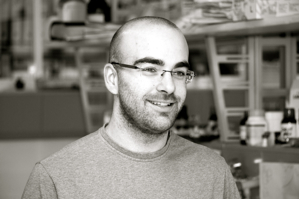
"Juan de la Cierva" fellow
andres.seoane@usc.es
Research area: Chemical biology
Andrés was born in 1988 in Santiago de Compostela. He studied Chemistry and MSc at the University of Santiago de Compostela. He received his PhD at the same University under the supervision of Prof. José L. Mascareñas and Dr. Moisés Gulías. He carried out one predoctoral stay at RWTH-AACHEN, under the supervision of Prof. Magnus Rueping. Additionally, he received the Lilly Award in 2015.
In 2020 he returned to the CiQUS as a postdoctoral fellow under the I2C program by the GAIN agency (Xunta de Galicia), supervised by Prof. Mascareñas. Afterwards, during the same year 2020, he received a Juan de la Cierva Incorporación fellowship also under Prof. Mascareñas supervision.
Currently, he is an Assistant Professor at IQS-Universitat Ramon Llull (Barcelona)
Then, he was a postdoc researcher at Prof Neal K. Devaraj group (University of Califonia
San Diego, USA) between 2016 and 2019, working on the generation of biomimetic dynamic liposomes.
In 2020 he returned to the CiQUS as a postdoctoral fellow under the I2C program by the GAIN agency (Xunta de Galicia), supervised by Prof. Mascareñas. Afterwards, during the same year 2020, he received a Juan de la Cierva Incorporación fellowship also under Prof. Mascareñas supervision.
With us:
PhD Student & Postdoctoral fellow
PhD Student & Postdoctoral fellow
Current position:
Assistant Professor at IQS-Universitat Ramon Llull
Assistant Professor at IQS-Universitat Ramon Llull
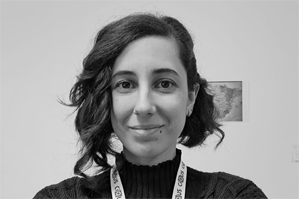
PhD visiting student
natali.pires@rai.usc.gal
Research area: Chemical Biology
Natalí was
born in 1992 in São Luiz Gonzaga (Brazil). She obtained her Technical degree in
chemistry in 2013 at Instituto Federal de Educação, Ciência e Tecnologia do Rio
Grande do Sul (IFRS). Then, she studied chemistry at Universidade Federal do
Rio Grande do Sul (UFRGS) obtaining both Bachelor degree, in 2018, and Master degree, 2019.
She has
joined our research group as a PhD visiting student in March 2023 for a 6-month exchange period. She has been under the
supervision of Prof. José Luis Mascareñas and Dr. María Tomás Gamasa.
Currently, she is a PhD
student also at UFRGS under the supervision of Prof. D. S. Lüdtke and Prof. F. S.
Rodembusch, working in the area of organic chemistry with emphasis in organic synthesis
and organic photophysics.
With us:
PhD visiting student
PhD visiting student
Current position:
PhD student at Universidade Federal do Rio Grande do Sul (UFRGS)
PhD student at Universidade Federal do Rio Grande do Sul (UFRGS)

"Juan de la Cierva" fellow
jessicarodriguez.villar@usc.es
Research area: Chemical Biology
Jessica studied Chemistry at the University of
Santiago de Compostela where she obtained her PhD under the supervision of
Prof. José L. Mascareñas and Prof. Eugenio Vázquez in 2016. During her PhD
studies, she carried out two predoctoral stays: at ICIQ (Spain) in 2011 under
the supervision of Prof. J. Mendoza, and at the University of Munich (Germany)
in 2013 under the supervision of Prof. T. Carell.
In 2017, she joined the group of Prof.
Bourissou at the LHFA (Toulouse, France) as Postdoctoral Researcher with a Fundación
Ramón Areces Fellowship. Later on, she got a Marie Curie Fellowship. She was
selected as finalist of the European Young Chemist Award 2018 (EYCA), and also
recognized with the Young Postdoctoral Researchers Award 2020 from the RSEQ. Recently,
she performed a 6-months postdoctoral stay in the group of Prof. Orozco (IRB,
Spain).
Right after finishing her period back at the University of
Santiago de Compostela as "Juan de la Cierva" Incorporación fellow (March 2024), under the supervision of Prof. Mascareñas, she started her fully independent research at CICA (University of A Coruña) as Ramón y Cajal fellow
With us:
PhD Student and Postdoctoral fellow
PhD Student and Postdoctoral fellow
Current position:
RyC fellow at CICA (UdC)
RyC fellow at CICA (UdC)